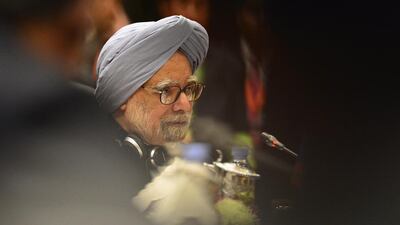NEW DELHI // After 10 years as India’s prime minister, Manmohan Singh will leave office in just over a week with the first assessments of his legacy proving critical and dismal.
For a man who once said “history will judge me more kindly than the contemporary media”, a slew of books and media commentary, as well as analyses by experts and voters, have faulted Mr Singh for letting the economy slide, for failing to combat corruption, and for being a weak prime minister.
Perhaps the most severe indictment came from Mr Singh’s friend and fellow economist, the Nobel laureate Amartya Sen.
Mr Singh would be remembered "by those who know him well as a sad figure, in the sense that he wanted to do much more about eliminating corruption. He did not have the political power to achieve this," Dr Sen told the Hindustan Times newspaper.
Mr Singh’s legacy appears particularly tragic given his glittering achievements and his reputation for integrity when he took office in 2004 for the first of the Congress Party’s two terms.
With degrees in economics from Cambridge and Oxford, he occupied a series of prestigious positions in the Indian government in the 1980s. Most notably, as the finance minister in 1991, he jump-started the Indian economy, liberalising import regimes, cutting tariffs and encouraging foreign investment.
When he started his first term as prime minister, the Congress had to form a coalition with the socialist parties of the Left, who oppose further economic reform. For this reason, said John Samuel Raja, a co-founder of How India Lives, a company that analyses government data, “people knew that it would be difficult for Mr Singh’s government to do much by way of reform”.
But at the beginning of Mr Singh’s second term, in 2009, the Congress won enough seats in parliament that it could form the government without the support of leftist parties. This raised hopes that Mr Singh, freed from the constraint of having to appease the left, would be able to undertake more reforms.
However, Mr Singh presided over a government that spent far more money than it earned, even as it failed to boost the economy’s productivity, Mr Raja said.
“They also misread the [global] economic crisis. Trying to keep growth high, they pumped too much money into the economy, which led to high inflation,”he said.
The economy overheated. Growth slowed anyway, to 4.5 per cent in the 2012-13 financial year, the lowest in a decade.
Simultaneously, Mr Singh’s government was rocked by controversy after controversy, as a string of corruption scandals were revealed. Nobody has been tried and sentenced in any of the scams thus far, but India’s auditor general has estimated that corruption has deprived the national treasury of billions of dollars in revenue.
In his new book The Accidental Prime Minister, Sanjaya Baru, Mr Singh’s former media adviser, remarked upon his peculiar stance on corruption.
Mr Singh “was himself incorruptible … but he did not feel answerable for the misdemeanours of his colleagues and subordinates,” Mr Baru wrote. “In practice, this meant that he turned a blind eye to the misdeeds of his ministers.”
In the midst of such a decline, Mr Singh compounded the situation by being uncommunicative with his public, said Navin Rajaram, a Bangalore-based entrepreneur. “As an informed voter, the biggest disappointment for me has been the lack of dialogue with me, the voter,” he said.
Several Indian governments have been plagued by scandals and poor records, but “I have felt let down by the prime minister not talking to the nation about these issues or being transparent about what the government is doing to address these wrongs,” Mr Rajaram said.
Even at the best of times, or when he had news of success to relay, Mr Singh proved to be too silent. “Many welfare schemes actually did penetrate and marginally improve the lives of the underprivileged,” Mr Rajaram said. But here too, Mr Singh refused to “maintain an ongoing conversation” with his country.
Mr Singh’s inability to assert himself or to govern according to his own moral code has been explained in different ways, even as commentators have been prompt to acknowledge the prime minister’s personal integrity and dignity.
In a column in the Business Standard newspaper on Saturday, TN Ninan, the paper's former editor, was warm about Mr Singh as a person, praising his "basic decency" and his commitment "to the old-fashioned notion of public service".
But often, Mr Ninan wrote, Mr Singh made too many expedient decisions that would simply ensure the survival of his government, rather than doing the right thing.
“Singh has said often that politics is the art of the possible,” Mr Ninan wrote. “The criticism would be that he did little to expand the range of possibilities. More often than not, he was willing to play along with whatever idea had political legs.”
In his book, Mr Baru argued that the very nature of Mr Singh’s position was problematic. Although he should have been, in theory, the most powerful man in the country, the real power resided with Sonia Gandhi, the head of the Congress party, who named Mr Singh to his post.
ssubramanian@thenational.ae

